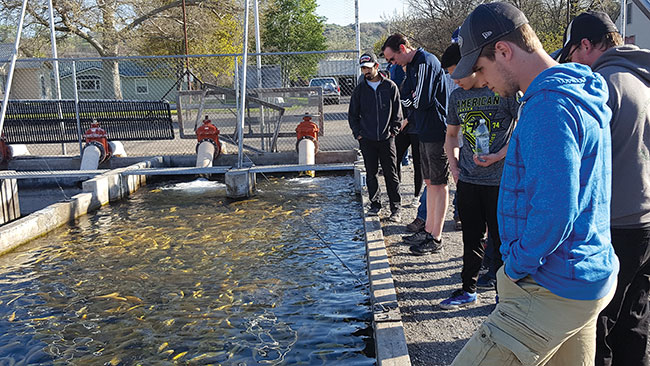
Ken’s Corner: Paving a career path in aquaculture
May 28, 2021
By Dr Kenneth Cain
Columnist wears his professor hat in giving career advice to young people
 Students looking at sturgeon at Idaho Fish and Game Hatchery. Formal training can range from a high school diploma, or certificate in aquaculture, to an advanced degree, says columnist
Students looking at sturgeon at Idaho Fish and Game Hatchery. Formal training can range from a high school diploma, or certificate in aquaculture, to an advanced degree, says columnist I hear it all the time; “we just can’t find qualified workers.” Hard-working employees with motivation and skills are in high demand within the field of aquaculture, but why is there a workforce shortage? And why is it so difficult for employers to find great employees?
These may be related to an insufficient understanding of what it means to work in this diverse field. One key component is training. You will see many programs offering a variety of educational and training opportunities in this edition of Aquaculture North America. Careers in this field typically require knowledge of rearing aquatic species under controlled conditions, and jobs can be found with private companies, government agencies, or even at various universities. Positions also exist in industries that support aquaculture. These include companies specializing in fish health, feed sales, feed ingredients, genetics, equipment supply, and more.
The common theme among employers is that they are looking for quality employees with a certain set of skills. These could include business or aquaculture management skills for the commercial sector, quantitative skills associated with data analysis, or specific laboratory skills in everything from water quality to molecular biology. As a student, seek out opportunities that will broaden your experiences. This will help guide your own path to a meaningful career and open doors by increasing your marketability.
Entry-level positions in aquaculture are great for building a resume, and for those seeking adventure and travel, global opportunities are common. You may find yourself working in a sea bass hatchery in the Mediterranean, a salmon farm in Tasmania, a trout hatchery in New Zealand, or even a shrimp farm in Costa Rica. Not only can you explore a different country, but you also gain valuable experience that demonstrates motivation and expands career options. I can say from my own experience that working in Australia after college helped shape my career and was one of the best and most rewarding decisions I have made. Searching regularly for aquaculture jobs on websites such as the World Aquaculture Society and American Fisheries Society is well worth the effort, and I strongly suggest keeping your experience relevant and up to date on sites such as LinkedIn, Indeed.com and Simplyhired.com. Employers are using these social media sites more than ever to recruit qualified employees. As I convey to my own students, gaining valuable skills and qualifications require “getting your hands wet,” so to speak, and no matter what, if you are passionate and work hard, you will be successful.
What will it take?
Education is a first step and is important whether working in a shellfish or oyster hatchery or as a fisheries technician, fish culturist, or hatchery manager. A strong background in biology, chemistry and math along with specific courses in aquaculture, aquatic animal health, nutrition, water quality, and even business and marketing will add to your knowledge base. Formal training can range from a high school diploma, or certificate in aquaculture, to an advanced degree. It is true that some aquaculture jobs (primarily in the private industry) can be obtained with minimal experience or schooling. However, when working in this field and caring for live animals, it is my opinion that proper training and a genuine desire to work and excel in the job are prerequisites for success. This holds true for the employee and the employer. Those employers that take the extra steps to find motivated and dedicated workers benefit in the long run with qualified, passionate employees who treat their work as more than just a job.
How’s the pay?
The US Bureau of Labor Statistics (BLS), reports that positions in aquaculture requiring a high school diploma with additional aquaculture training certificates range in pay from $25,000 to over $30,000. Those with more formal training at the associates or bachelors level can start much higher in all sectors, with estimates for government agency jobs (local, state, or federal) ranging from $38,000 to over $48,000 per year. Sales positions in aquaculture and agriculture support industries have median salary of over $80,000. Wage potential clearly increases with greater experience and education, but the take home message is that hard work creates opportunities that will pay off and lead to a successful and meaningful career.
If you are passionate about working with fish or other aquatic species, then aquaculture or an aquaculture related field may be the right fit for you. Take it from someone who started down a different career path, drive and ambition will take you wherever you want to go! The field of aquaculture is diverse and expanding dramatically, and for those who are willing to work hard, a career in this field will be both exciting and extremely rewarding.
Ken Cain is a Professor at the University of Idaho who teaches courses on Fish Health Management, Aquaculture, and Wild/Hatchery Fish Interactions. Ken’s passion for fishing led him to a lifelong career in aquaculture and research focused on fish immunology and vaccine development. He continues to be motivated by a desire to solve problems that challenge the industry and impact fishery resources.
Advertisement
- ‘Dancing’ fish could be key to ridding salmon farms of parasites
- Sludge treatment specialist enters US market





